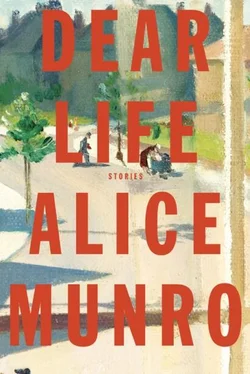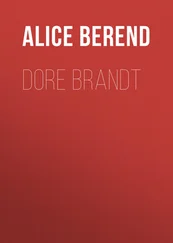Then I heard my mother sniffling and felt her pulling away. There was a click of her purse being opened. She had to get her hand in there, so her hold on me weakened and I was able to get myself free of her. She was weeping. It was attention to her tears and sniffles that had set me loose.
I looked straight into the coffin and saw Sadie.
The accident had spared her neck and face but I didn’t see all of that at once. I just got the general impression that there was nothing about her as bad as I had been afraid of. I shut my eyes quickly but found myself unable to keep from looking again. First at the little yellow cushion that was under her neck and that also managed to cover her throat and chin and the one cheek I could easily see. The trick was in seeing a bit of her quickly, then going back to the cushion, and the next time managing a little bit more that you were not afraid of. And then it was Sadie, all of her or at least all I could reasonably see on the side that was available.
Something moved. I saw it, her eyelid on my side moved. It was not opening or halfway opening or anything like that, but lifting just such a tiny bit as would make it possible, if you were her, if you were inside her, to be able to see out through the lashes. Just to distinguish maybe what was light outside and what was dark.
I was not surprised then and not in the least scared. Instantly, this sight fell into everything I knew about Sadie and somehow, as well, into whatever special experience was owing to myself. And I did not dream of calling anybody else’s attention to what was there, because it was not meant for them, it was completely for me.
My mother had taken my hand again and said that we were ready to go. There were some more exchanges, but before any time had passed, as it seemed to me, we found ourselves outside.
My mother said, “Good for you.” She squeezed my hand and said, “Now then. It’s over.” She had to stop and speak to somebody else who was on the way to the house, and then we got into the car and began to drive home. I had an idea that she would like me to say something, or maybe even tell her something, but I didn’t do it.
There was never any other appearance of that sort and in fact Sadie faded rather quickly from my mind, what with the shock of school, where I learned somehow to manage with an odd mixture of being dead scared and showing off. As a matter of fact some of her importance had faded in that first week in September when she said she had to stay home now to look after her father and mother, so she wouldn’t be working for us anymore.
And then my mother had found out she was working in the creamery.
Yet for a long time when I did think of her, I never questioned what I believed had been shown to me. Long, long afterwards, when I was not at all interested in any unnatural display, I still had it in my mind that such a thing had happened. I just believed it easily, the way you might believe and in fact remember that you once had another set of teeth, now vanished but real in spite of that. Until one day, one day when I may even have been in my teens, I knew with a dim sort of hole in my insides that now I didn’t believe it anymore.
WHEN I was young, there seemed to be never a childbirth, or a burst appendix, or any other drastic physical event that did not occur simultaneously with a snowstorm. The roads would be closed, there was no question of digging out a car anyway, and some horses had to be hitched up to make their way into town to the hospital. It was just lucky that there were horses still around—in the normal course of events they would have been given up, but the war and gas rationing had changed all that, at least for the time being.
When the pain in my side struck, therefore, it had to do so at about eleven o’clock at night, and a blizzard had to be blowing, and since we were not stabling any horses at the moment, the neighbors’ team had to be brought into action to take me to the hospital. A trip of no more than a mile and a half but an adventure all the same. The doctor was waiting, and to nobody’s surprise he prepared to take out my appendix.
Did more appendixes have to be taken out then? I know it still happens, and it is necessary—I even know of somebody who died because it did not happen soon enough—but as I remember it was a kind of rite that quite a few people my age had to undergo, not in large numbers by any means but not all that unexpectedly, and perhaps not all that unhappily, because it meant a holiday from school and it gave you some kind of status—set you apart, briefly, as one touched by the wing of mortality, all at a time in your life when that could be gratifying.
So I lay, minus my appendix, for some days looking out a hospital window at the snow sifting in a somber way through some evergreens. I don’t suppose it ever crossed my head to wonder how my father was going to pay for this distinction. (I think he sold a woodlot that he had kept when he disposed of his father’s farm. He would have hoped to use it for trapping or sugaring. Or perhaps he felt an unmentionable nostalgia.)
Then I went back to school, and enjoyed being excused from physical training for longer than necessary, and one Saturday morning when my mother and I were alone in the kitchen she told me that my appendix had been taken out in the hospital, just as I thought, but it was not the only thing removed. The doctor had seen fit to take it out while he was at it, but the main thing that concerned him was a growth. A growth, my mother said, the size of a turkey’s egg.
But don’t worry, she said, it’s all over now.
The thought of cancer never entered my head and she never mentioned it. I don’t think there could be such a revelation today without some kind of question, some probing about whether it was or it wasn’t. Cancerous or benign—we would want to know at once. The only way I can explain our failure to speak of it was that there must have been a cloud around that word like the cloud around the mention of sex. Worse, even. Sex was disgusting but there must be some gratification there—indeed we knew there was, though our mothers were not aware of it—while even the word cancer made you think of some dark rotting ill-smelling creature that you would not look at even while you kicked it out of the way.
So I did not ask and wasn’t told and can only suppose it was benign or was most skillfully got rid of, for here I am today. And so little do I think of it that all through my life when called upon to list my surgeries, I automatically say or write only “Appendix.”
This conversation with my mother would probably have taken place in the Easter holidays, when all the snowstorms and snow mountains had vanished and the creeks were in flood, laying hold of anything they could get at, and the brazen summer was just looming ahead. Our climate had no dallying, no mercies.
In the heat of early June I got out of school, having made good enough marks to free me from the final examinations. I looked well, I did chores around the house, I read books as usual, nobody knew there was a thing the matter with me.
Now I have to describe the sleeping arrangements in the bedroom occupied by my sister and myself. It was a small room that could not accommodate two single beds side by side, so the solution was a pair of bunk beds, with a ladder in place to help whoever slept in the top bunk climb into bed. That was me. When I had been younger and prone to teasing, I would lift up the corner of my thin mattress and threaten to spit on my little sister lying helpless in the bunk below. Of course my sister—her name was Catherine—was not really helpless. She could hide under her covers, but my game was to watch until suffocation or curiosity drove her out, and at that moment to spit or successfully pretend to spit on her bared face, enraging her.
Читать дальше












